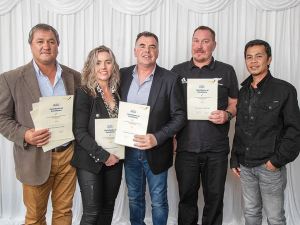Record final milk price for Miraka suppliers
Farmers supplying milk to Taupo-based processor Miraka are getting a 2024-25 season base milk price of $10.16/kgMS.
 Miraka Excellence Awards 1 Certificate Holders - representatives from Te Raparahi Trust including Phillip Samuels, Murray and Tracey Simpson, Craig Walker & Dave Bajoyo.
Miraka Excellence Awards 1 Certificate Holders - representatives from Te Raparahi Trust including Phillip Samuels, Murray and Tracey Simpson, Craig Walker & Dave Bajoyo.
Miraka's insistence on sustainable farming practices has shown results in more farms winning honours in the recent Te Ara Miraka farming excellence awards.
“Since establishing the awards four years ago we’ve started to see significant change in on farm practices,” says Grant Jackson, general manager milk supply.
“We’re not just meeting the regulations, that’s mandatory for us. Rather we’re going over and above, to achieve excellence in animal welfare, sustainable land management, looking after employees and premium quality milk.”
Seventeen of 104 participating farms scored 90% or more and Te Raparahi Lands Trust took won the top prize with 100%. Only 10 farms reached 90% when the awards began four years ago.
Mandatory and optional excellence criteria apply to farms. Achieving the optionals will gain a farmer points and a payout higher than a market competitive base milk price.
“When Miraka first brought out the standards I thought they looked pretty challenging,” says top award winner Tracey Simpson of Te Raparahi Lands Trust.
“I was worried it was too much pressure for farmers and that we would never be able to meet all of them. But there’s a real change in the farming community, and we know strong environmental practices are good for the land and they make financial sense.”
The team at Te Raparahi Lands Trust have worked on a holistic farming approach for 10 years, says Phillip Samuels, Te Raparahi Lands Trust chairpman.
“For us it’s having shared goals and pushing ourselves to do more. Last year we used our incentive payment to purchase a new Halo monitoring system for our farms, which has been a great investment.
“Miraka’s approach is helping create a paradigm shift within New Zealand farming, to encourage farmers to start making positive changes.”
Each year Miraka is seeing more farmers grow and accelerate change within the programme, says Murray Hemi, Miraka’s Kaitiaki and GM environmental leader.
“At Miraka we value kaitiakitanga, we support decisions with a long
term view, we build resilience into our business and live our values while creating top quality dairy products.
“Our farmers are starting to see the value in our approach. It’s exceptional to have so many of our farms hitting high targets.”
Horticulture New Zealand (HortNZ) has added its perspective to numerous primary sector voices urging the Government to strengthen its draft legislation to replace the Resource Management Act (RMA).
The Commerce Commission has finalised new information disclosure requirements for local councils and water organisations that deliver water supply and wastewater services.
Beef + Lamb NZ (B+LNZ) is calling for significant changes to the Government’s reforms to the Resource Management Act (RMA).
NZPork says the Government needs to strengthen its proposed planning laws to ensure New Zealand's pig farmers can continue to produce pork.
Good news for kiwifruit growers - a record crop with forecast per hectare returns at record levels for all fruit categories for the 2025-26 season.
As guests gathered on what is known as the Speaker's Lawn - a beautifully manicured patch of grass behind the main buildings of Parliament - to mingle and enjoy a lamb chop to celebrate National Lamb Day, the mood was very much upbeat.